|
|
|
Sort Order |
|
|
|
Items / Page
|
|
|
|
|
|
|
| Srl | Item |
| 1 |
ID:
082931


|
|
|
|
|
| Publication |
2008.
|
| Summary/Abstract |
This paper critically examines the different ways that analysts and policy-makers have assessed the future shape of the Cuban regime following the future passing of its long-time revolutionary leader, Fidel Castro. Certainly, from a social science perspective, the future of Cuba after Fidel Castro is open. On the other hand, different, often mutually inconsistent scenarios for regime transition suggest that Cuba's future is over-determined. Both features of social reality - openness and over-determination - create space for visions, ideologies, strategies, and other normative interventions designed to impose a particular cognitive and political order on social reality. While social science should try to include such 'subjective factors' in its objective account, it must maintain a critical distance from the normative closure and hopeful predictions that ideologies and strategies of necessity imply. Based on an analytical distinction between relatively stable systems and rapidly changing systems, this paper identifies and goes on to discuss the major systems of primary relevance for Cuba's future.
|
|
|
|
|
|
|
|
|
|
|
|
|
|
|
|
| 2 |
ID:
153710
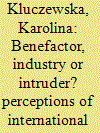

|
|
|
|
|
| Summary/Abstract |
Soon after the breakdown of the Soviet Union in 1991, a civil war started in Tajikistan (1992–97). This was also the period when a number of international organizations arrived in the country to distribute humanitarian assistance and assist in conflict resolution and stabilization. After the UN, the Organization for Security and Co-operation in Europe (OSCE) was the second key organization which appeared in the conflict-stricken country. Like other key international organizations in Tajikistan, the OSCE, which has been in the country since 1994, has seen a shift in its original functions of monitoring and emergency assistance. Some see its avowed objectives in the new century as formalistic, virtual and ineffective. By capturing perceptions of foreign assistance to Tajikistan among employees of the OSCE and other international organizations, NGO workers, government officials and ordinary citizens, this article explores how Tajikistan ‘socialized’ the OSCE, making the organization simultaneously a benefactor, an industry and even an intruder.
|
|
|
|
|
|
|
|
|
|
|
|
|
|
|
|
| 3 |
ID:
173437
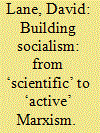

|
|
|
|
|
| Summary/Abstract |
Historical materialism envisages law-like tendencies (‘scientific’ Marxism) promoting the development of productive forces and, concurrently, a political praxis (‘active’ Marxism) requiring human intervention. These positions give rise to conflicting interpretations of Marxism: first to understand society, second to change it – to abolish economic exploitation. The twentieth century witnessed a shift in the locus of the contradictions of capitalism to the economically dependent territories of the imperial powers. Socialist parties, when in power and adopting a Leninist political praxis, furthered modernisation and were successful in reducing economic exploitation. The paper addresses the relationship between the scientific and praxis components of Marxism in contemporary global capitalism. It considers post-Marxist interpretations of the changing class structure, the rise of identity politics and the evolving nature of capital. Forms of domination, oppression and discrimination (bureaucracy, patriarchy, racism, militarism and credentialism) give rise to their own distinctive forms of power relations. It is contended that they should not be equated with Marx’s crucial insight into the nature of economic exploitation. Many current Marxist (and ‘post-Marxist’) writers adopt a ‘scientific’ position emphasising the inherent contradictions of capitalism. The author claims that without appropriate political praxis, the resolution of such contradictions is unlikely to transcend capitalism.
|
|
|
|
|
|
|
|
|
|
|
|
|
|
|
|
| 4 |
ID:
104756
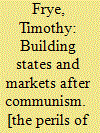

|
|
|
|
|
| Publication |
Cambridge, Cambridge University Press, 2010.
|
| Description |
ix, 296p.
|
| Series |
Cambridge studies in comparative politics
|
| Standard Number |
9780521734622
|
|
|
|
|
|
|
|
|
|
|
|
Copies: C:1/I:0,R:0,Q:0
Circulation
| Accession# | Call# | Current Location | Status | Policy | Location |
| 056009 | 338.947/FRY 056009 | Main | On Shelf | General | |
|
|
|
|
| 5 |
ID:
153927


|
|
|
| 6 |
ID:
161360
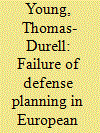

|
|
|
|
|
| Summary/Abstract |
By any objective measure, defense institutions in Central and Eastern Europe have all but universally been incapable of producing viable defense plans that are based on objective costing and operational planning data. This situation exists in spite the provision of considerable Western advice and assistance, let alone reporting to and receiving assessments by NATO’s International Staff under Partnership for Peace, as well as via the integrated defense planning and reporting systems. An explanation for this systematic failure across European post-Communist defense institutions can be found in the continued slow development of an over-arching policy framework which directs and approves all activities of the armed forces, as well as the de-centralization of financial decision-making down to capability providers. The essay ends with an examination of the adverse effects of the early introduction of planning programming, budgeting system (PPBS), have had on the development of effective policy and planning capabilities within these defense institutions.
|
|
|
|
|
|
|
|
|
|
|
|
|
|
|
|
| 7 |
ID:
081084


|
|
|
|
|
| Publication |
New Burnswick, Transaction Publishers, 2007.
|
| Description |
ix, 124p.
|
| Standard Number |
9781412807265
|
|
|
|
|
|
|
|
|
|
|
|
Copies: C:1/I:0,R:0,Q:0
Circulation
| Accession# | Call# | Current Location | Status | Policy | Location |
| 053189 | 320.12/SEM 053189 | Main | On Shelf | General | |
|
|
|
|
| 8 |
ID:
153712
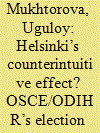

|
|
|
|
|
| Summary/Abstract |
Since the late 1990s, the post-communist states of Central Asia, as ‘participating States’ of the Organization for Security and Cooperation in Europe, have been regularly persuaded by the organization to invite its Office for Democratic Institutions and Human Rights to monitor their national parliamentary and presidential elections. The OSCE/ODIHR’s objectives have been to assist the Central Asian participating states in holding free and fair elections and aid in a presumed ongoing post-communist democratization process. We argue that contrary to OSCE’s assumptions, repeated OSCE/ODIHR election observations of Central Asian states with histories of fraudulent elections (as demonstrated by the case study of Tajikistan during 2000–2013) have not contributed to the flourishing of democracy and political pluralism, but rather inadvertently aided in the solidification of authoritarianism and ‘virtual democracy’ – a phenomenon we refer to as ‘Helsinki’s counterintuitive effect’. Using stakeholder interviews, we test four hypotheses in support of this general proposition.
|
|
|
|
|
|
|
|
|
|
|
|
|
|
|
|
| 9 |
ID:
052766


|
|
|
|
|
| Publication |
London, Frank Cass, 2004.
|
| Description |
241p.
|
| Standard Number |
0714684155
|
|
|
|
|
|
|
|
|
|
|
|
Copies: C:1/I:0,R:0,Q:0
Circulation
| Accession# | Call# | Current Location | Status | Policy | Location |
| 048368 | 327.091717/RIC 048368 | Main | On Shelf | General | |
|
|
|
|
| 10 |
ID:
080077


|
|
|
| 11 |
ID:
071899
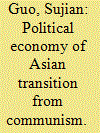

|
|
|
|
|
| Publication |
Aldershot, Ashgate Publishing Limited, 2006.
|
| Description |
213p.
|
| Standard Number |
0754647358
|
|
|
|
|
|
|
|
|
|
|
|
Copies: C:1/I:0,R:0,Q:0
Circulation
| Accession# | Call# | Current Location | Status | Policy | Location |
| 051286 | 338.95/GUO 051286 | Main | On Shelf | General | |
|
|
|
|
| 12 |
ID:
160616


|
|
|
|
|
| Summary/Abstract |
Post-communist states today are dealing with conflicting sources of ontological insecurity. They are anxious to be perceived as fully European by “core” European states, a status that remains fleeting. Being fully European, however, means sharing in the cosmopolitan European narratives of the twentieth century, perhaps the strongest being the narrative of the Holocaust. Influencing the European Union’s own memory politics and legislation in the process, post-communist states have attempted to resolve these insecurities by undergoing a radical revision of their respective Holocaust remembrance where the memory, symbols, and imagery of the Holocaust become appropriated to represent crimes of communism. By rejecting the cosmopolitan European narrative of the Holocaust, post-communist states have also removed anti-fascist resistance from the core memory of the Holocaust, allowing for a revival and ideological normalisation of contemporary fascist ideological movements. I illustrate the argument with an overview of contemporary Holocaust remembrance practices in the EU’s youngest member, Croatia.
|
|
|
|
|
|
|
|
|
|
|
|
|
|
|
|
| 13 |
ID:
047762


|
|
|
|
|
| Publication |
New York, Basic Books, 2000.
|
| Description |
xxix, 233p.
|
| Standard Number |
0465051960
|
|
|
|
|
|
|
|
|
|
|
|
Copies: C:1/I:0,R:0,Q:0
Circulation
| Accession# | Call# | Current Location | Status | Policy | Location |
| 047108 | 338.9/OLS 047108 | Main | On Shelf | General | |
|
|
|
|
| 14 |
ID:
160995


|
|
|
|
|
| Summary/Abstract |
Using two recently published essays by the current writer that assesses the dismal record of performance of Planning, Programming, and Budgeting System in enabling communist legacy defence institutions in Central and Eastern Europe to develop viable defence plans, this essay argues the need for deep reforms in the region’s defence institutions. To guide this reform effort, pragmatic solutions are suggested to improve the ability of these organisations to produce viable defence plans. Recommended reforms are: (1) conduct conceptual and cultural “audits,” (2) make operational and financial data central to decision-making, (3) change current organisational sociology, (4) examine planning methods and practices, and (5) stress the need to adopt policy frameworks to drive the operation of defence institutions.
|
|
|
|
|
|
|
|
|
|
|
|
|
|
|
|
| 15 |
ID:
060021
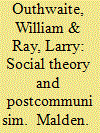

|
|
|
|
|
| Publication |
Malden, Blackwell Publishing, 2005.
|
| Description |
viii, 256p.
|
| Standard Number |
0631211128
|
|
|
|
|
|
|
|
|
|
|
|
Copies: C:1/I:0,R:0,Q:0
Circulation
| Accession# | Call# | Current Location | Status | Policy | Location |
| 049363 | 301.01/OUT 049363 | Main | On Shelf | General | |
|
|
|
|
| 16 |
ID:
065169


|
|
|
|
|
| Publication |
London, Routledge, 1994.
|
| Description |
xx, 198p.
|
| Standard Number |
0415910455
|
|
|
|
|
|
|
|
|
|
|
|
Copies: C:1/I:0,R:0,Q:0
Circulation
| Accession# | Call# | Current Location | Status | Policy | Location |
| 050460 | 335.4/DER 050460 | Main | On Shelf | General | |
|
|
|
|
| 17 |
ID:
153849
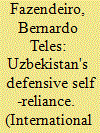

|
|
|
|
|
| Summary/Abstract |
President Islam Karimov's death provides an opportunity to gauge the origins and consequences of Uzbekistan's foreign policy. This article is aimed at contributing to that on-going conversation. To do so, it assesses the nature of Uzbekistani foreign policy, which the author categorizes as a type of defensive self-reliance, and to what extent the latter conditioned the government of Uzbekistan's international engagement. The author describes the main features of self-reliance and argues that the pursuit thereof led to five key trends: the relentless concern with international equality; a focus on bilateral relations; an aggressive defence of Uzbekistan's image; a drive for self-sufficiency; and a reluctance to embrace expansionist ideological agendas. To make his argument, the author begins by conceptualizing and distinguishing between ‘defensive’ and ‘offensive’ manifestations of self-reliance. He then traces the patterns of Uzbekistani self-reliance and concludes with a brief assessment of potential consequences were the foreign policy to change in the near future. The conclusion suggests that a shift from defensive to offensive self-reliance may constitute a problematic change to Uzbekistani foreign policy, but that relaxing any other of those trends may help open up the republic and the region of post-Soviet central Asia as a whole.
|
|
|
|
|
|
|
|
|
|
|
|
|
|
|
|
| 18 |
ID:
077630


|
|
|
|
|
| Publication |
Seattle, University of Washington Press, 2006.
|
| Description |
viii, 301p.
|
| Standard Number |
9780295986289
|
|
|
|
|
|
|
|
|
|
|
|
Copies: C:1/I:0,R:0,Q:0
Circulation
| Accession# | Call# | Current Location | Status | Policy | Location |
| 052393 | 335.43/TIS 052393 | Main | On Shelf | General | |
|
|
|
|
|
|
|
|
|